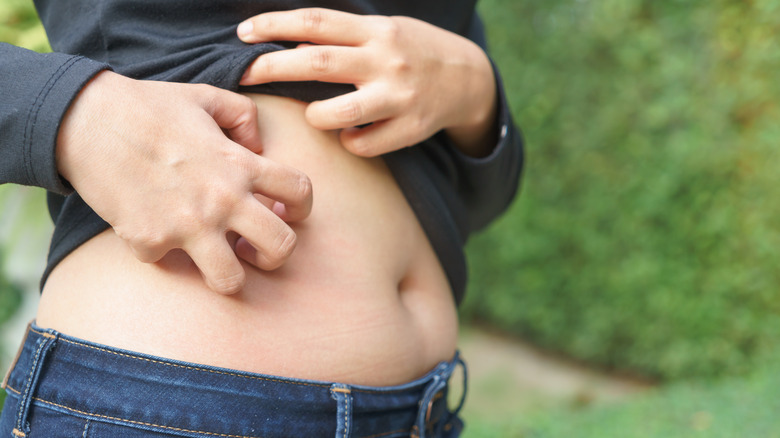The Weird Reasons Weight Loss Can Make Your Skin Itch
Weigh loss is an individualized journey that takes a different path for everyone. Some side effects include stronger muscles, a lower body mass index, and a need to buy new outfits. Other side effects might not be so pleasant, like itchy skin.
Skin itch happens to everyone occasionally, especially if you have eczema or psoriasis. But itchy skin correlating with your weight loss journey could have several causes. If you notice your skin itching where your clothing rubs or in the folds of the skin, it's possible that you're dealing with friction itch or an infection. Those experiencing an all-over itch or dry patches of skin that have nothing to do with rubbing might have a deficiency in their diet that needs correcting. Furthermore, an itch on your stomach associated with little red or white lines is typically due to stretch marks.
We can help you learn more about your weight loss-related itch by diving into the distinct symptoms. We'll also examine at-home treatments to try before heading to your healthcare provider's office.
Intertrigo can cause itch during weight loss
Diet and exercise are vital parts of losing weight. However, exercise can also be the culprit behind your annoying skin itch. Tanya Nino, M.D., a dermatologist with St. Joseph Hospital, told Livestrong, "Depending on how much and what exercise you are doing to lose weight, itching also can be related to frictional irritation." Frictional irritation goes by the name "intertrigo" in the medical community and causes irritation, burning, stinging, and even pain in the affected area, states StatPearls. Excessive sweat in the creases and folds of the skin creates irritation and itching as the skin rubs against material or together.
Sagging skin rubbing together also creates chafing and itch. It's a common symptom of those experiencing rapid weight loss. Your skin has the unique capacity to stretch to accommodate the fat underneath it; however, carrying that extra weight causes damage to the elastin and collagen, leading to loose skin. This is especially true of those experiencing a weight loss of 100 pounds or more, states Healthline. As the folds rub against each other, the itchy rash forms. Cleveland Clinic states that keeping the area clean and dry, using powders or skin barriers to prevent chafing, and applying ointments can give some relief.
Skin infections can lead to an irritating itch
According to 2013 research in the International Journal of Dermatology, "Sportive activity is accompanied by significant changes of skin physiology that could stress the barrier function of the skin." So, the sweat you create while shedding those pounds opens your skin up to outside invaders. The impairment of the skin could be responsible for lesions on the skin or bacterial or fungal infections.
A common bacterial infection among those who exercise is impetigo. The Hughston Clinic notes that athletes could be more at risk for developing this condition due to contact with locker room showers and gym mats. NHS Inform states impetigo causes blistering sores on the mouth, nose, and limbs which can be painful. The sores are caused by the Staphylococcus aureus or Streptococcus pyogenes. Scratching the sores causes the infection to spread. Nothing is needed to treat this infection, however, since it typically clears up on its own.
Warm, sweaty folds in the skin can also open you up to yeast infections, like candidiasis. Healthline notes that this skin infection causes a red, itchy rash in areas like the armpits, under the breasts, and in the stomach crease. Antifungal creams and skin drying work to keep this fungal infection at bay. You'll also want to avoid tight clothing and change sweaty clothes as soon as possible.
Itchy skin could be coming from diet
Some diets help you to shed the pounds quickly, but they can cause issues for your skin. For example, eating a diet low in unsaturated fats can lead to pruritus (chronic itch). A 2015 study completed by Experimental Dermatology showed hairless mice fed a diet low in unsaturated fatty foods developed an itch. However, once those same mice were fed unsaturated fats, the itch cleared up. The same study played with removing specific starches within the diet to see the effect. It concluded that atopic dermatitis (inflamed, itchy skin) was induced by removing starches like cornstarch.
Medical News Today said the keto diet causes an itchy rash known as the "keto rash." This rash typically develops on the upper part of the body and is thought to be a side effect of ketosis. A 2011 study in the Journal of the European Academy of Dermatology and Venereology showed excessive fasting could also result in the rash since it also results in ketosis. Other causes might include hormonal changes and bariatric surgery complications. Adding carbs back into your diet can help to relieve the symptoms. You might also try creams and ointments if changing your diet isn't enough.
Stretch marks can make you itch
Typically stretch marks are associated with weight gain; however, you can face stretch marks during weight loss, according to the American Academy of Dermatology Association (AAD). It notes that rapid weight loss is one of the factors associated with stretch mark development. Stretch marks aren't harmful, but they cause narrow bands on the skin because the abrupt weight loss leads to collagen and elastin rupturing.
Stretch marks can be found anywhere, but the stomach is a common area. The reason they itch is due to the healing process. Healthline states the skin is trying to fill in the stretched area with a scar, causing it to feel itchy and irritated. You'll want to fight the urge to scratch, however, opting instead to apply oils like cocoa butter, coconut oil, and vitamin E oil. Moisturizers and cortisone creams also work to fight the irritating itchiness.
It's not always possible to prevent stretch marks from forming during weight loss, especially when experiencing fast weight loss. However, the AAD did note that centella (herb) and hyaluronic acid (a natural compound in the skin) may help in the prevention. Drinking water to stay hydrated can also assist in keeping your skin supple.





